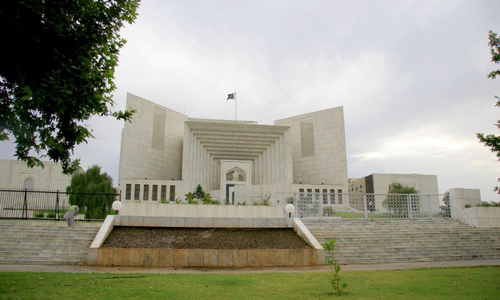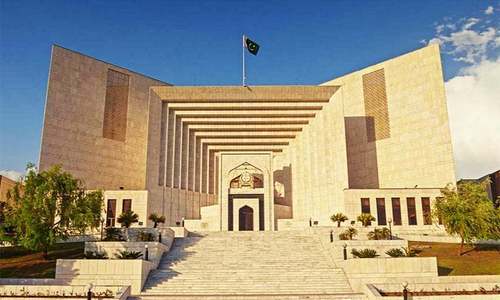ISLAMABAD: A government cannot be run by promulgating ordinances because parliament was the supreme institution in a democratic set-up, and not ordinances, observed Justice Syed Mansoor Ali Shah of the Supreme Court on Thursday.
The observations came during the hearing of a set of petitions seeking review of the Supreme Court’s Aug 17 judgement which rendered almost 17,000 government employees jobless.
On the eve of his retirement, Justice Mushir Alam had on Aug 17 declared as illegal and unconstitutional a PPP-era law, the Sacked Employees (Reinstatement) Ordinance Act 2010 (SERA), under which hundreds of individuals were either employed or promoted.
A five-judge SC bench, headed by Justice Umar Ata Bandial, has been hearing the petitions.
Attorney General given a ‘set of questions’, asked to address them on the next date of hearing
Raza Rabbani, who is representing the sacked employees from the Intelligence Bureau (IB) in the case, said the government was being virtually run through ordinances.
As if this were not enough, Mr Rabbani added, ordinances were not being placed before parliament — a requirement under Article 89 of the Constitution.
“It amounts to denying parliament an opportunity to reject temporary laws,” the former Senate chairman contended.
In his observations, Justice Shah said if the legislature votes against an ordinance, the law stands repealed and no protection is available under Article 264 of the Constitution, according to which the repeal of an ordinance would have no effect on any right, privilege or obligation accrued under it.
The Supreme Court gave a set of questions to Attorney General (AGP) Khalid Jawed Khan and asked him to address them on Monday (Dec 13), the next date of hearing.
The bench said its priority in the present case was to uphold a fundamental guarantee under Article 25 of the Constitution, which stipulates that all citizens are equal in the eyes of the law. The reinstatement of a “particular group of people” has created a special class of individuals in violation of Article 25, according to the bench.
The court sought the AGP’s assistance on a question whether the court could explore avenues to trim down the illegalities committed in SERA.
The questions framed by Justice Bandial required the government to explain how many of the individuals sacked through the Aug 17 judgement were government employees and how many of them were on the payroll of autonomous or semi-autonomous organisations and corporations.
The Supreme Court also wanted to know whether these employees were inducted on merit or not.
The AGP will also have to explain whether the ordinance or the Sacked Employees (Reinstatement) Ordinance Act overrides the previous decisions of the courts, including the Supreme Court, since some of the employees were reinstated or their cases rejected through previous court orders, Justice Bandial observed.
The attorney general was asked to explain what benefit these employees could claim for the period they worked for the government before their services were terminated.
On Monday, the government will have to come up with an explanation about its change of heart — when the case was being heard earlier by a bench headed by Justice Mushir Alam, the government had opposed the law, but now it was supporting it.
Earlier, senior counsel Hamid Khan, who is representing 1,121 employees of the Sui Southern Gas Company (SSGC), argued that the Supreme Court had to look into the fact that a sizable number of people had suffered and to alleviate their sufferings, the legislation was brought for valid purposes.
He further argued that the court should treat the case of these employees as a “past and closed transaction” since they served for some time and then suffered for another length of time.
Published in Dawn, December 10th, 2021














































